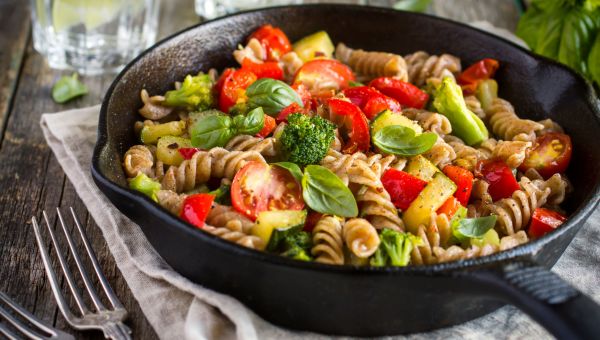The best and worst foods for hep C
Find out which foods you should (and shouldn't) eat with hepatitis C.
Updated on September 5, 2024

Your liver helps your body in a variety of ways, such as detoxifying your system and turning food into energy and nutrients. But if you have hepatitis C (hep C), your liver may be damaged and may need some extra help doing its job.
Being mindful about what you eat is critical to having a healthy liver. Eating a nutritious diet during hep C treatment will help your… Show More
Your liver helps your body in a variety of ways, such as detoxifying your system and turning food into energy and nutrients. But if you have hepatitis C (hep C), your liver may be damaged and may need some extra help doing its job.
Being mindful about what you eat is critical to having a healthy liver. Eating a nutritious diet during hep C treatment will help your immune system fight off the hepatitis virus, boost your liver function, and cut your risk of cirrhosis. Some foods, however, can actually damage your liver.
Here’s what to eat—and what to avoid—while receiving hepatitis C treatment.
Show Less
Avoid: alcohol
Just one glass of wine is harmless, right? Not for people with hep C. Even small amounts of alcohol can speed up liver damage, which may lead to other health issues, such as cirrhosis (scarring of the liver), cancer, and liver disease. There’s no safe amount of alcohol that those with hep C… Show More
Just one glass of wine is harmless, right? Not for people with hep C. Even small amounts of alcohol can speed up liver damage, which may lead to other health issues, such as cirrhosis (scarring of the liver), cancer, and liver disease. There’s no safe amount of alcohol that those with hep C can drink, so it's best to avoid it altogether.
Show Less
Enjoy: coffee and tea
Some studies have shown that coffee can slow the progression of hep C and prevent liver cancer and cirrhosis. One theory is that caffeine may play a role in slowing down the replication process of the hepatitis C virus.
Make sure to drink strong coffee, though. Decaf coffee may not deliver the same… Show More
Some studies have shown that coffee can slow the progression of hep C and prevent liver cancer and cirrhosis. One theory is that caffeine may play a role in slowing down the replication process of the hepatitis C virus.
Make sure to drink strong coffee, though. Decaf coffee may not deliver the same benefits. If you’re not a coffee drinker, green tea is another great option, as it contains additional helpful compounds.
Show Less
Avoid: multivitamins and supplements
Supplements may seem like an easy way to get all the nutrients you need, but if you're not careful, multivitamins can end up doing more harm than good. Getting too much iron or vitamin A, for example, can further damage your liver. And just because a supplement is labeled "all natural" or "herbal"… Show More
Supplements may seem like an easy way to get all the nutrients you need, but if you're not careful, multivitamins can end up doing more harm than good. Getting too much iron or vitamin A, for example, can further damage your liver. And just because a supplement is labeled "all natural" or "herbal" doesn't mean it is automatically safe to take.
Try to get all the vitamins and nutrients your body needs through the foods you eat. If you're worried that your diet is lacking, talk to your healthcare provider (HCP) to see if there's a vitamin that will work with your treatment.
Show Less
Enjoy: whole grains
Whole grains are a healthy source of fiber for everyone, but they're particularly beneficial to people with hep C. Adding more whole grains to your diet can help reduce your risk for diabetes, which people with hep C are more likely to develop.
Whole grains, like brown rice, oats, quinoa, and… Show More
Whole grains are a healthy source of fiber for everyone, but they're particularly beneficial to people with hep C. Adding more whole grains to your diet can help reduce your risk for diabetes, which people with hep C are more likely to develop.
Whole grains, like brown rice, oats, quinoa, and barley, have greater amounts of certain key nutrients than refined grains. Always check ingredients for whole grains and watch out for misleading labels such as "multigrain" or "100% wheat." Despite their names, these products may still be largely refined.
Show Less
Avoid: excessive amounts of salt
One of the symptoms of advanced hep C is fluid retention and swelling. To avoid a swollen belly or legs, try to eat a low-sodium diet. Sodium can hide in many processed foods and fast foods, so it’s important to talk to your HCP about how much sodium you should have in your diet and how you can limit added salt.

Enjoy: water
Being adequately hydrated is always a smart choice when it comes to your health. According to the Centers for Disease Control and Prevention (CDC), there is no recommended daily amount of water to aim for, as the amount you need depends on many factors. These include the weather, your activity… Show More
Being adequately hydrated is always a smart choice when it comes to your health. According to the Centers for Disease Control and Prevention (CDC), there is no recommended daily amount of water to aim for, as the amount you need depends on many factors. These include the weather, your activity levels, your health, and your diet. To know if you’re getting enough water, check the color of your urine. If it’s clear or light yellow- to straw-colored, you’re likely hydrated enough.
Show Less
Avoid: added sugar
If you crave sugar, opt for fruit rather than treats with added sugars. These are added to foods during processing. They don’t naturally occur in foods. Too much added sugar may cause fatty liver disease, weight gain, and insulin resistance. Even some “healthy” forms of sugar such as honey, agave,… Show More
If you crave sugar, opt for fruit rather than treats with added sugars. These are added to foods during processing. They don’t naturally occur in foods. Too much added sugar may cause fatty liver disease, weight gain, and insulin resistance. Even some “healthy” forms of sugar such as honey, agave, maple syrup, and molasses may contain too much sugar and should be enjoyed in moderation.
Show Less
Enjoy: fruits and veggies
As part of a heathy diet, it’s important for everyone to eat fruits and vegetables, but it's especially vital for people with hep C. Plant-based foods contain a variety of flavonoids, compounds that may help the body fight viral infections. Healthy greens and fruits also contain many vitamins and… Show More
As part of a heathy diet, it’s important for everyone to eat fruits and vegetables, but it's especially vital for people with hep C. Plant-based foods contain a variety of flavonoids, compounds that may help the body fight viral infections. Healthy greens and fruits also contain many vitamins and minerals that can help boost your energy levels and fight fatigue, a common symptom of hep C and treatment. Plus, these healthy foods can help you lose weight, contribute key nutrients to your diet, and make your diet healthier overall.
Show Less
Avoid: foods rich in iron
Both the hep C virus and fatty liver disease can cause too much iron to accumulate in the body, potentially leading to worsening liver health and several health issues, such as joint pain, diabetes, and heart failure.
This means that foods high in iron should be avoided by those living with hep C.… Show More
Both the hep C virus and fatty liver disease can cause too much iron to accumulate in the body, potentially leading to worsening liver health and several health issues, such as joint pain, diabetes, and heart failure.
This means that foods high in iron should be avoided by those living with hep C. Foods that contain an especially large amount of iron include oysters, red meat, and iron-enriched processed foods.
Show Less
Illinois Department of Central Management Services: Be Well Illinois. Hepatitis and Nutrition. Page accessed September 5, 2024.
Centers for Disease Control and Prevention. Hepatitis C Basics. Page accessed September 5, 2024.
Wijarnpreecha K, Thongprayoon C, Ungprasert P. Impact of caffeine in hepatitis C virus infection: a systematic review and meta-analysis. Eur J Gastroenterol Hepatol. 2017 Jan;29(1):17-22.
Liu F, Wang X, Wu G, Chen L, et al. Coffee Consumption Decreases Risks for Hepatic Fibrosis and Cirrhosis: A Meta-Analysis. PLoS One. 2015 Nov 10;10(11):e0142457.
U.S. Department of Veterans Affairs. Nutrition in Early Liver Disease. Page accessed September 5, 2024.
Yang WS, Zeng XF, Liu ZN, et al. Diet and liver cancer risk: a narrative review of epidemiological evidence. Br J Nutr. 2020 Aug 14;124(3):330-340.
Jardim ACG, Shimizu JF, Rahal P, et al. Plant-derived antivirals against hepatitis c virus infection. Virol J. 2018 Feb 13;15(1):34.
Centers for Disease Control and Prevention. On Your Way to Preventing Type 2 Diabetes. Page accessed September 5, 2024.
Centers for Disease Control and Prevention. About Water and Healthier Drinks. Page accessed September 5, 2024.
U.S. Department of Veterans Affairs. Nutrition in Early Liver Disease. Page accessed November 9, 2023.
Jensen T, Abdelmalek MF, Sullivan S, et al. Fructose and sugar: A major mediator of non-alcoholic fatty liver disease. J Hepatol. 2018 May;68(5):1063-1075.
Coronati M, Baratta F, Pastori D, et al. Added Fructose in Non-Alcoholic Fatty Liver Disease and in Metabolic Syndrome: A Narrative Review. Nutrients. 2022 Mar 8;14(6):1127.
Schmidt SM. The role of iron in viral infections. Front Biosci (Landmark Ed). 2020 Jan 1;25(5):893-911.
Zou DM, Sun WL. Relationship between Hepatitis C Virus Infection and Iron Overload. Chin Med J (Engl). 2017 Apr 5;130(7):866-871.
Cleveland Clinic. Hemochromatosis (Iron Overload). Page last reviewed January 1, 2021.
Milman NT. Managing Genetic Hemochromatosis: An Overview of Dietary Measures, Which May Reduce Intestinal Iron Absorption in Persons With Iron Overload. Gastroenterology Res. 2021 Apr;14(2):66-80.
More On


video


video


video


video
